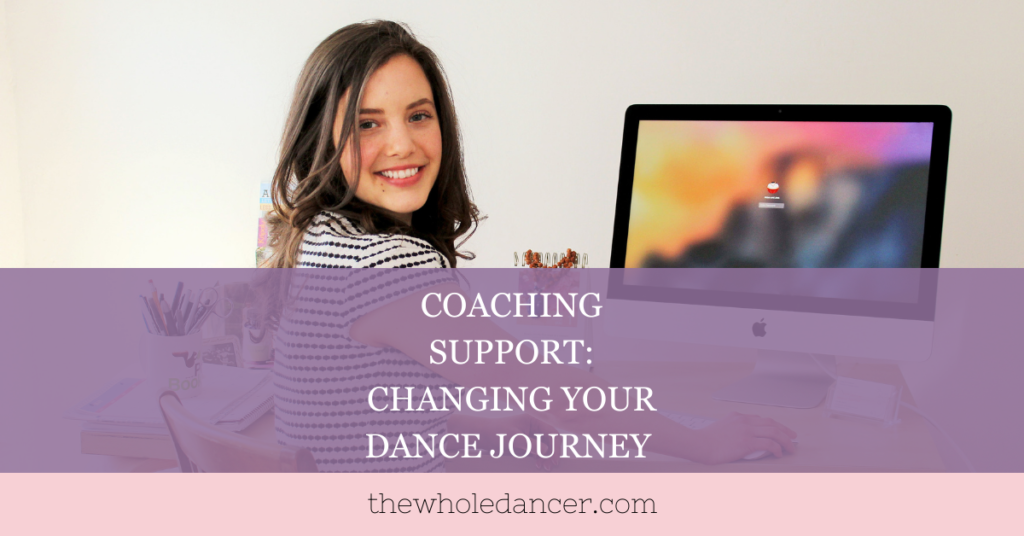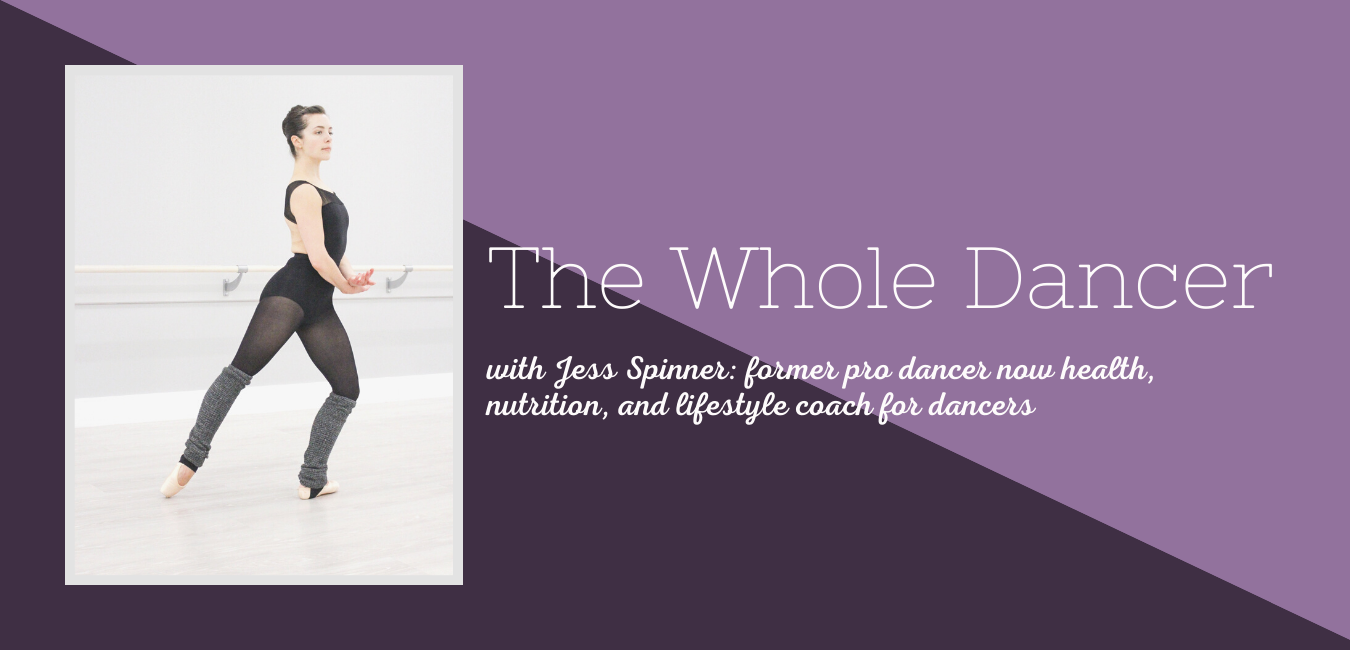Coaching Support for Dancers: Health, Nutrition, and Lifestyle Coaching
There’s a mentality that comes up around many support services: I don’t need that. You might follow The Whole Dancer and see what I offer but say to yourself, This is great for someone but not for me. There’s a variety of reasons you may have come to that conclusion for yourself.
It might be that you think your challenges aren’t that bad. Surely others have it much worse and they’re the ones who need coaching. It’s possible the vulnerability of coaching is what holds you back. The thought that it’s too embarrassing to admit to someone how you truly feel about yourself, food, or your dance pursuits.
In order to help you see just how much coaching could change the trajectory of your dance pursuits, this post shares about some of the dancers who have been reaching out for support, just in the last couple weeks.
These dancers all fall into a handful of clear categories. Many of these categories involve a transition, but you don’t have to be in transition to seek out coaching.

Going to a pre-professional program.
Many of the dancers under 18 who I hear from are just starting out at a pre-professional program or have plans to pursue that path in the near future. Sometimes a parent reaches out for them, but the coaching relationship is infinitely more abundant and fruitful when the dancers themselves understand and see the value of coaching.
In this transition, dancers benefit from learning to adjust to the unknown. It may be the first time they’re responsible for putting together their own meals or managing schedules. These dancers may be dealing with homesickness or struggling with confidence in their bodies and dancing in a more competitive environment. Coaching supports them through those struggles and gives them strategies and tools to shift their view and approach.
Starting a college dance program.
This transition is one I’m very familiar with as I studied dance and arts administration at Butler University. Many college dance programs offer the opportunity to prioritize both dance and academics. This has some incredible benefits but comes with a lot of commitment on the dancer’s part.
There is social pressure in college that impacts how you relate to food and your body in new ways. For dancers, there is often a question of priorities and how to balance that with a social life. Dancers in the first couple of years in college benefit from coaching to support them in maximizing their time there. In the last couple of years of college, dancers benefit from audition support as they prepare to transition out of their school “bubble.”
Starting your first job.
Whether straight out of high school or after college, it’s a huge transition starting your first job. Many of the dancers I work with have similar feelings I had in this shift. In some ways you feel incredibly prepared by your pre-professional training, and in other ways you feel totally lost, unprepared, and very stressed.
For the college dancer, there’s often a fear of being “too old” — being surrounded by teens and YAGP winners. These dancers all benefit from support to continue to care for their minds and bodies proactively. They also benefit from the simple reassurance that whatever company they’re starting out in has chosen them for a reason, and working hard, striving towards balance, and showing up with a growth mindset is going to allow them to thrive.
Moving to a new company.
When I work with a dancer, there’s a possibility they’ll discover through our work that they’re not at the best company for them. This can be a scary thing to discover, but it can also be completely game changing for their career. Many of these dancers have come to me after getting lots of body feedback.
Despite working through Elite Best Body Coaching to feel confident and self-assured in your body, you may continue to get body feedback from others if you stay where you’re currently dancing. To me, this indicates that it’s time for a change. This doesn’t have to be a bad thing, but coming to this realization alone can be hard. That’s where mindset coaching through auditions and transitioning to a new company is invaluable. On the other side of that, you can rediscover your love and joy for dance unencumbered by daily body insecurities.
Retiring from pro dancing.
As a dancer moves away from dancing for hours a day, every day, there is the prospect of weight gain and body change that is very scary for many of us. When I went through this myself, my priority was to build a healthy relationship with my body and a balanced approach to food.
By prioritizing my well-being, I was able to increase self-love and body confidence exponentially. That’s what I support dancers to do through retirement. Even if they’re still in the studio taking class or teaching, they are able to be a support to themselves and their students.
Dance teachers and adult dancers.
There’s definitely some overlap in these groups. Some of the dance teachers who seek coaching support are also former professional dancers. They want to let go of the unhealthy mindsets that dancing in their youth caused and also create a healthy environment for their students.
Adult dancers are often influenced by professional ballet dancers and think that to do their best dancing, they should aspire to look like them. The reality is, if you’re not on a professional dancing schedule, it’s not a fair standard to put on yourself. Every adult dancer I’ve worked with is incredibly dedicated to their dancing and goals, and sees the value of support in the areas of nutrition, lifestyle, and a building confident mindset.
You don’t have to be in transition to benefit from coaching.
Maybe you don’t need a health, nutrition, and lifestyle coach (specifically one who works with dancers). You probably can figure it all out on your own…it might take a long time.
But when you do this, you might find you’re spinning in confusion, doubt, and overwhelm. So, instead of moving forward in your dance journey in big, fearless, extraordinary ways…
You stay small.
And all those big dreams inside of you?
They go unanswered.
But if you want to find your greatest joy in dance and have a dance experience that’s full of possibility, achievement, and fun? The answer might be to work with a coach who understands exactly what you’re up against.
I’ve seen dancers completely shift their approach to dance, food, their bodies, and life through our work together.
Are you ready for more joy in your dancing?
Elite Best Body Coaching
This program focuses on your relationship to your body and food. It follows a 7-step process and allows you to grow and transform the way you relate to yourself. It’s an investment that can transform your career trajectory. If you’re stuck in a negative body image, how well will you audition? How well will you perform in class or on stage?
In this 6-month program, we meet every single week for 30-minutes so you’re taking consistent, pointed action towards your goals for your body and dance. If you’re interested in exploring this support service, schedule a chat here.
Balanced Life Wellness Coaching
For the dancer who feels mostly OK in their relationship to food and their body but they recognize that their life could use an overhaul. Maybe you’re struggling to prioritize your well-being or you’d like to create a vision for your dance journey so you’ll have more pointed goals and a clear drive for your dance journey.
In this 6-month program we meet every week for 30-minutes to make the necessary adjustments to your approach to dance and life so you’re at your most productive, happiest, and healthiest. If you’re interested in exploring this support service, schedule a chat here.
Would therapy be more beneficial?
The truth is, somewhere around 75–80% of the dancers working with me currently are also working with a therapist. A therapist and a coach play different roles. Here’s more about what a health, nutrition, and lifestyle coach can do for you.

Pingback:9 Mindset Skills for Your Summer Intensive - The Whole Dancer
Pingback:What It Means To Be a Healthy Dancer - The Whole Dancer
Pingback:Optimal Nutrition for Summer Intensives - The Whole Dancer
Pingback:Dancer: Is Nutrition Support Actually What You Need? - The Whole Dancer
Pingback:Dealing with Casting in Dance - The Whole Dancer